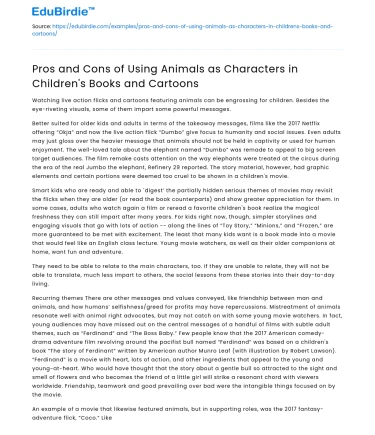Watching live action flicks and cartoons featuring animals can be engrossing for children. Besides the eye-riveting visuals, some of them impart some powerful messages.
Better suited for older kids and adults in terms of the takeaway messages, films like the 2017 Netflix offering “Okja” and now the live action flick “Dumbo” give focus to humanity and social issues. Even adults may just gloss over the heavier message that animals should not be held in captivity or used for human enjoyment. The well-loved tale about the elephant named “Dumbo” was remade to appeal to big screen target audiences. The film remake casts attention on the way elephants were treated at the circus during the era of the real Jumbo the elephant, Refinery 29 reported. The story material, however, had graphic elements and certain portions were deemed too cruel to be shown in a children's movie.
Save your time!
We can take care of your essay
- Proper editing and formatting
- Free revision, title page, and bibliography
- Flexible prices and money-back guarantee
Smart kids who are ready and able to `digest’ the partially hidden serious themes of movies may revisit the flicks when they are older (or read the book counterparts) and show greater appreciation for them. In some cases, adults who watch again a film or reread a favorite children's book realize the magical freshness they can still impart after many years. For kids right now, though, simpler storylines and engaging visuals that go with lots of action -- along the lines of “Toy Story,” “Minions,” and “Frozen,” are more guaranteed to be met with excitement. The least that many kids want is a book made into a movie that would feel like an English class lecture. Young movie watchers, as well as their older companions at home, want fun and adventure.
They need to be able to relate to the main characters, too. If they are unable to relate, they will not be able to translate, much less impart to others, the social lessons from these stories into their day-to-day living.
Recurring themes There are other messages and values conveyed, like friendship between man and animals, and how humans’ selfishness/greed for profits may have repercussions. Mistreatment of animals resonate well with animal right advocates, but may not catch on with some young movie watchers. In fact, young audiences may have missed out on the central messages of a handful of films with subtle adult themes, such as “Ferdinand” and “The Boss Baby.” Few people know that the 2017 American comedy-drama adventure film revolving around the pacifist bull named “Ferdinand” was based on a children's book “The story of Ferdinant” written by American author Munro Leaf (with illustration by Robert Lawson). “Ferdinand” is a movie with heart, lots of action, and other ingredients that appeal to the young and young-at-heart. Who would have thought that the story about a gentle bull so attracted to the sight and smell of flowers and who becomes the friend of a little girl will strike a resonant chord with viewers worldwide. Friendship, teamwork and good prevailing over bad were the intangible things focused on by the movie.
An example of a movie that likewise featured animals, but in supporting roles, was the 2017 fantasy-adventure flick, “Coco.” Like “Ferdinand,” cultural considerations were not disregarded by the filmmakers as they presented small nods to daily life in certain countries -- in the case of “Ferdinand” it was Spain and for “Coco” it was Mexico.
Themes and plots related to friendship between humans and animal creatures -- a recurring theme in children’s fairy tales and even films geared towards children -- do generate attention. A case in point is the 1999 American comedy-adventure film Stuart Little loosely based on the novel of the same title penned by E.B.White. Animal-human friendship is also depicted in other movies, including “Christopher Robin,” “Ratatouille,” plus many others.
A study to assess whether storybooks with anthropomorphic (which means attributing human form or personality to non-human things or animals) animal-characters promote prosocial behavior in children was conducted by researchers from the University of Toronto. The study was published in the journal Developmental Science. The researchers, who read to preschoolers between the ages of four and six years a story about sharing with human characters, and then the story with anthropomorphized animal characters, uncovered that material with humans in them significantly increased preschoolers’ altruism.
On the other hand, reading them the anthropomorphic story or a control story reduced it. Kids generally find it easier to apply knowledge from stories with realistic, content and characters, Science Daily reported. This was confirmed by one of the authors of the study, Dr. Patricia Ganea, associate professor of early cognitive development at University of Toronto. She and her colleagues deduced that human characters tend to have more sway for young viewers as far as acting on the moral of the story is concerned.
Talking and emotion-displaying animals may prove the downfall of many a children's book, but there are exceptions, as American author-critic Stephen Amidon shared in an article for The Guardian. Amidon noted that books along the league of the E.B.White novel, “Charlotte's Web” drew him into the barnyard world. The honesty, simplicity and forthrightness of the book fascinated him so much he introduced the reading option to his own children.
Despite what studies point out, animal fiction is here to stay. Many younger children aged three to seven or beyond may even have favorite books with empathic animals in them. The fact is that there are kids who are delighted or even thrilled at seeing animals -- in books, television, or videos accessible through computers or smartphones. Given the values they impart, and the cultural realities they may depict, a few well-made books-turned-into-movie offerings merit attention.






 Stuck on your essay?
Stuck on your essay?

